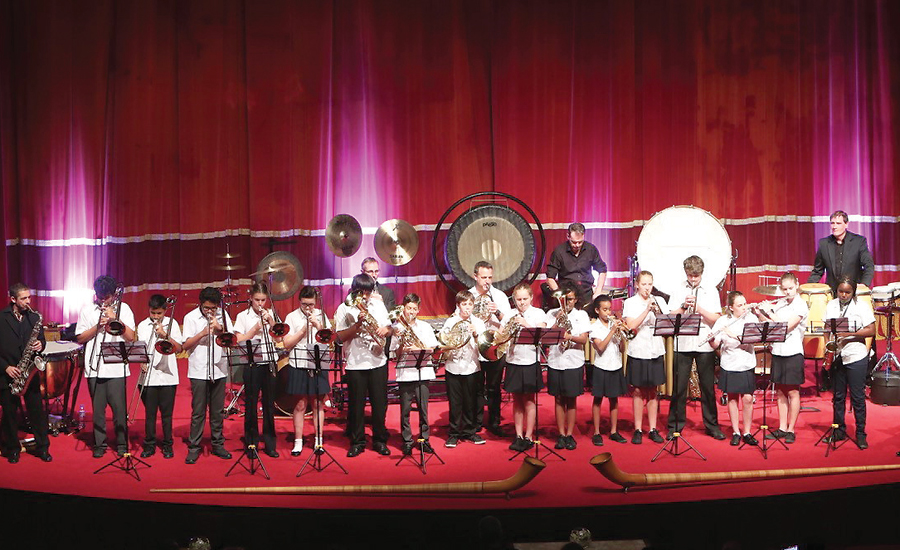


Georgina Benison -
On Monday evening, February 6, Arabesque International, together with the German Embassy in Muscat, presented the second concert in the third season of the Muscat Chamber Music Series at the Oman Auditorium of the Al Bustan Palace, a Ritz-Carlton hotel. This was no ordinary concert and it was by no means Classical, even though the five members of the Jacaranda Ensemble are from the Brandenburg Orchestra in Germany — one of the top symphony orchestras of the world.
They titled their performance, a musical journey, and it truly was an eclectic tour of many styles and genres from around the world, reflecting their experiences while on tour with the orchestra, and the versatility of these fine musicians. Their signature instrument is the long, unwieldy alpenhorn from Bavaria which they have ingeniously combined with the Australian didgeridoo (an alpendidgeridoo) to create a lyrical bass sound which underlies much of their repertoire.
The other common link throughout the concert was the repetitive ostinatos on the Marimba (Xylophone) which gave their music a haunting, hypnotic quality, played by the virtuoso percussion player and band leader, Matthias Dressler.
Their third number featured the multi-instrumentalist, Sebastian Pietch, playing an Irish whistle in a Kerry jig duet with French horn maestro, Thomas Hoffman, taking the concept of ‘Fusion’ to another level! Later he played soprano and tenor saxophones at once — yes, both simultaneously.
The concert opened in a distinctly Arabic mood and scale with Sebastian on lurs, a bamboo reed flute, in the evocative piece, Derwisch. This led to the highly rhythmic, ‘Colour of Earth’, a jazzy number which featured Richard Mosthaf on didgeridoo — a feat requiring some stamina of breathing!
The audience was next whisked to a mysterious country with the smooth, silky sounds of tenor saxophone, suggesting rivers and rain forests in ‘Mauna Kea’ featuring a melange of exotic percussion instruments.
It was delightful to hear the two Alpenhorns suggesting their native Switzerland in a beautifully serene moment in ‘Mountain Dream’ which involved the watery, silver ripples of a vibraphone and marimba duet, with distant calls of Ireland from Sebastian’s tin whistle again — a global exchange, to be sure. Lastly to China in “Heartbeat” with a double Marimba solo, which of course played on a pentatonic melody, but so fast it could only have been played by the virtuostic Matthias Dressler with Thomas Ringleb. It was accompanied by quintessentially Latin percussion: congas, maracas and temple blocks.
The first half concluded with a sterling performance by 16 students from the British School Muscat, led by Dan Anthony, with illuminating solos from the quintet.
Part two opened with Schega, a scherzo or musical joke in Bulgarian, and then followed one of the highlights for me. The MC, Thomas Hoffmann, reminded us of the band’s classical background and then proceeded with a reference to Bach on saxophone which moved to a Kurt Weill-like Tango, (‘Canto Della Luna’ or Song of the Moon) and later a Shostakovich March-parody in ‘Step by Step’, a brilliant piece of pastiche, and sensuously executed.
I had never realised just how lyrical and expressive Alpenhorns could be until the opening melody of the Jacaranda Blues, entitled ‘Fancy Nancy Blues’ which clearly suggested Gershwin at his best. But the best was to come:
Their second to last presentation was a percussion improvisation, suggesting undergraduates exploring new textures in sound, giving each musician a chance to solo in a very avante-garde medium in ‘Imagination’. Last of all we heard a rhythmic Finale on a Los Angeles street scene — ‘3rd street Promenade’ — a fitting end to a wonderful trip through a global sound-scape. The band had delighted the audience with their antics and gestures as much as with their inspiring performance.
But it wasn’t the end of course. There were two encores, an Indian-inspired, highly danceable ‘Irinshaja’ and a Fanfare Adieu encore which was played on Indonesian Angklung. The roots of this Jacaranda tree spread far and wide throughout the world, and as we left the auditorium two hours later we were reminded of Thomas’s words: Oman is a beautiful, friendly country. And I think we were all proud to be here.
The concert was a culmination of a ten-day stay in the Sultanate which also included workshops at Muscat International School, The British School, PDO School, ROSO and a private performance at the German Ambassador’s residence to honour the visiting delegation of the Committee for Economic Affairs and Energy of the German Bundestag.
Oman Observer is now on the WhatsApp channel. Click here



